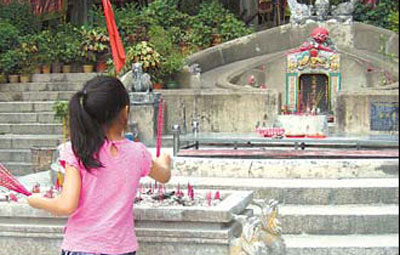Few people link history with Shenzhen, in South China's Guangdong Province, a city founded in 1979, where almost all of the buildings are new. There is one place in Shenzhen, however, that seems far removed from the modernity and bustle of the city - the tomb of Shaodi, or Zhao Bing, the last emperor of the Song Dynasty (960-1279).
Located near Chiwan harbor, in the Nanshan District of Shenzhen, Shaodi's Tomb is the only emperor's tomb in Guangdong Province.
From the Nanshan Company bus stop, it is an enjoyable 10-minute walk to Shaodi's Tomb, as there are few cars on the road, and the only sound is of birds chirping in the trees.
The statue of Lu Xiufu who is carrying the 9-year-old emperor on his back.
Unlike most parts of Shenzhen, the road to the tomb reminds me of Hangzhou, a picturesque city in Zhejiang Province. You will almost have arrived at Shaodi's tomb when you come to Chiwan Primary School.
Shaodi (meaning "junior emperor") was a child. He was just 9 years old when his life came to an end, together with the Song Dynasty.
After Yuan (1271-1368) emperor Kublai Khan conquered the Southern Song capital of Lin'an (today's Hangzhou) in 1276, Song ministers Lu Xiufu, Zhang Shijie and Wen Tianxiang escorted Shaodi to Xinhui, in Guangdong Province, and backed him to become emperor in 1278.
They built a temporary palace and army camps in Xinhui, and prepared boats and food for battle against the Yuan. However, the Yuan army surrounded their base in 1279 and defeated the remaining Song troops.
When resistance finally crumbled, Prime Minister Lu jumped into the sea, with Shaodi on his back, and drowned, in order to avoid being humiliated by the Yuan. Many generals and soldiers followed them.
Today, there is a statue of Lu carrying Shaodi, at Shaodi's Tomb.
According to a local legend, Shaodi's corpse floated to Chiwan village, in today's Shenzhen, and a group of birds perched on his body to protect it against the fish.
When the villagers saw a child's corpse in an emperor's robes, a wooden beam in the Palace of Tianhou (Goddess of the Sea) fell down. After consulting oracles, the villagers knew it was Shaodi's body and used the beam, from the Goddess of the Sea, to make his coffin.
The villagers buried Shaodi to the west of Palace of Tianhou. There is also a Tianhou shrine beside Shaodi's Tomb.
Though the last emperors of every dynasty had dramatic lives, Shaodi's short life seems particularly tragic.
Was Shaodi ready to give up his young life for the glory of the Song Dynasty when Lu took him into the sea? Or was it something he couldn't really understand, as a 9-year-old boy?
Had he come from a common family, he would have lived on like anybody else after the end of the Song, but as an emperor, he had no choice.
Before the War of Resistance Against Japanese Aggression (1937-45), descendants of Shaodi's family, from Hong Kong and overseas, kept the tradition of sweeping Shaodi's Tomb during the Qingming Festival (tomb-sweeping, a time for Chinese people to visit their ancestors' tombs).
After the war broke out, Shaodi's descendants couldn't continue the tradition because of the chaotic situation and Shaodi's Tomb became overgrown.
Shaodi's Tomb is often veiled in incense as people pray to him for the welfare of children.
In 1963, People's Liberation Army kitchen staff found Shaodi's Tomb in the forest while picking firewood. In 1983, it was listed as a cultural relic by the government of Shenzhen.
With donations from the China Merchants Shekou Industrial Zone and the Zhao Clan Association of Hong Kong, Shaodi's Tomb was renovated in 1984.
Today, the tomb is situated in pleasant surroundings, in front of Small Nanshan Mountain and facing the sea. In this quiet place one can hear students from Chiwan Primary School reciting texts. It seems fitting.
Nowadays Shaodi is regarded as a god of children in local folklore, and Shaodi's Tomb is constantly veiled in incense, as people pray to him for the welfare of their children.
Chen, a fortune teller who operates near the tomb, said that he was busiest on the first and 15th day of every lunar month, as many people arrive to worship Shaodi.
"Shaodi is a very kind god. You needn't worship him all the time, but you have to be respectful," he said.
(China Daily December 20, 2007)



